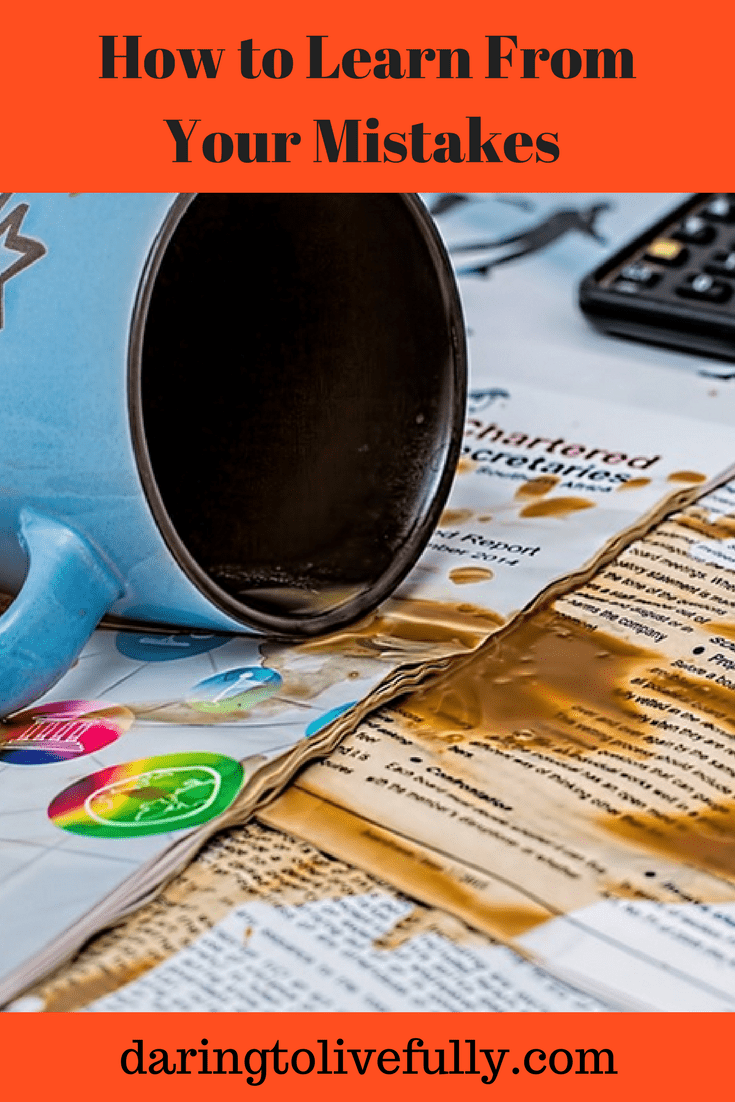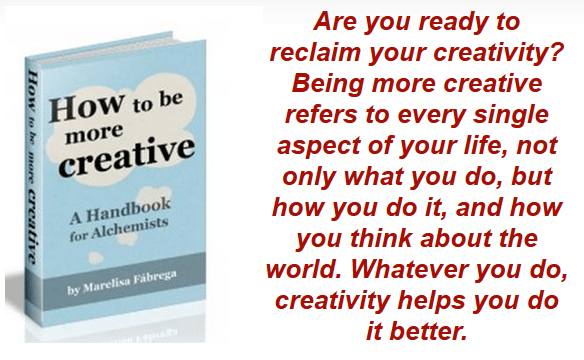
Mistakes can be a good thing – if you learn from them.
You’ve probably heard repeatedly that it’s fine to make mistakes, as long as you learn from them. But that can be easier said than done. After all, society is very good at punishing people for making mistakes. On the other hand, we’re never really taught how to learn from our mistakes.
No worries. I’ve got you covered. I know a lot about making mistakes–I’ve definitely made my share of them. And I also know how to learn from them.
Below you’ll find six ways to learn from your mistakes.
1. Be Willing to Admit Your Mistakes
 Kathryn Schultz– an American journalist and author–explains in her TED Talk, “On Being Wrong”, that we all understand in the abstract that everyone makes mistakes. However, when we think of ourselves in any given situation, this acceptance of fallibility goes out the window. We feel that we’re right about everything.
Kathryn Schultz– an American journalist and author–explains in her TED Talk, “On Being Wrong”, that we all understand in the abstract that everyone makes mistakes. However, when we think of ourselves in any given situation, this acceptance of fallibility goes out the window. We feel that we’re right about everything.
After all, realizing that we’re wrong feels bad. It can be embarrassing and it can even make us feel stupid. But if you’re wrong and you don’t acknowledge it, then you don’t feel those negative feelings — being wrong and not acknowledging it, feels like being right.
This unwillingness to feel the negative feelings that come from accepting that we’re wrong makes us very attached to being right. In turn, this attachment to our rightness does the following:
- It doesn’t allow us to prevent the mistakes that are preventable.
- It doesn’t allow us to learn from our mistakes so that we can avoid making those same mistakes in the future.
Therefore, the first step to take in order to learn from your mistakes is to admit when you’ve made a mistake. Simply allow yourself to say: “I’m wrong”, and tolerate the discomfort that comes along with that.
I would argue that being able to admit that you’ve made a mistake is a sign of intelligence. It means that you’ve being able to do the following:
- You’ve overridden society’s conditioning that making mistakes and being wrong is shameful.
- You have self-awareness: you have the ability to step outside of yourself, notice what you’re doing, and evaluate it objectively.
- You’ve recognized that being able to admit your mistakes, and learn from them, is an important tool for achieving your full potential.
When you’ve admitted that you’ve made a mistake, you’ve taken the first step toward learning from that mistake.
2. Don’t Dwell On Your Mistakes
In the previous point I encouraged you to admit your mistakes, even if this means having to feel the discomfort of acknowledging that you were wrong. However, the idea here isn’t to replay your mistakes in your head in an endless loop like a broken record. Rumination offers few insights and will keep you stuck in a negative state.
Susan Nolen-Hoeksema, Ph.D, a former psychologist and professor at Yale University, indicates that, instead of dwelling on your mistakes, you need to practice adaptive self-reflection.
This means taking the time to reflect on your mistakes with the purpose of identifying how you need to alter your behavior so that you can do better the next time. You can differentiate between rumination and adaptive self-reflection by asking yourself the following:
- Is this keeping me stuck in the past? Then it’s rumination.
- Is this helping me to learn and grow? Then it’s adaptive self-reflection.
One way to practice adaptive self-reflection is by asking yourself the right questions. This is addressed in the next point.
3. Ask the Right Questions
When you’ve made a mistake, to learn from it, you need to ask yourself the right questions. Here are some examples of the questions you should be asking in order to learn from your mistakes:
- Is there something you can do to remedy the mistake?
- What can still be salvaged?
- Is there a hidden opportunity in the mistake?
- What was the cause of the mistake?
- Was the goal that you set for yourself feasible?
- Did you make a mistake in the strategy or the method that you chose to follow?
- Did you make a mistake executing the plan?
- What should you have done differently?
- Were there any warning signs that you missed?
- Did you make any assumptions that turned out to be wrong?
- Has making this mistake revealed any of your blind spots?
- What did this teach you about other people and how they behave?
- Did this mistake reveal that there’s a skill that you lack or that you need more practice in?
- What worked? What didn’t work?
- Did this mistake reveal a character trait that’s holding you back, such as hubris or inflexibility?
- What insight did you gain from this mistake?
- Did a negative habit play a role in this mistake, such as going to bed late, failing to put things back where they belong, or leaving things until the last minute?
- How will you do things differently moving forward?
- What will you do to prevent this—or something like this—from happening again?
- How do you think your behavior should/would change if you were in a similar situation in the future?
- If you saw someone else making a similar mistake, how would you advise them?
Learn from your mistakes by going carefully through the answers that you gave to the questions above.
4. Practice Self-Compassion
Once you’ve asked yourself the right questions and have identified the lessons you can learn from the mistake you made, release any remaining negative feelings you may have about the mistake by showing yourself self-compassion.
I’ve already referred on this blog to a study conducted by the University of California, Berkeley on the positive effects of self-compassion.
That study found that, when students did poorly on a test, they were more motivated to spend more time studying for the next test if they were reminded to show themselves self-compassion. The researchers used phrases like the following:
- “Try not to be too hard on yourself.”
- “It’s common for students to have difficulty with tests like these.”
Here are some phrases you can use to show yourself self-compassion the next time you make a mistake:
- “I’m not my mistakes. My mistakes don’t define me.”
- “No one has ever succeeded in life without making mistakes.”
- “Making mistakes is part of being human.”
- “I’m proud of myself for having tried.”
- “I made a mistake, but I’m not going to beat myself up over it.”
- “I’m grateful to this mistake for the lesson it taught me.”
- “I’m now better equipped to do better in my next attempt.”
- “I can’t undo this mistake, but I can refuse to carry it into the future.”
- “I forgive myself for having made this mistake. I’m ready to move on.”
- “I’m going to take corrective action and try again.”
In order to allow yourself to learn from your mistakes, you need to show yourself self-compassion.
5. Learn From Your Mistakes and Move On Fearlessly
The Irish playwright George Bernard Shaw once said the following:
“A life spent making mistakes is not only more honorable, but more useful than a life spent doing nothing.”
The fear of never achieving anything worthwhile, and failing to even try to go after what you want in life, should be much bigger than the fear of making mistakes.
Plan ahead and look for ways to avoid making mistakes to the extent that you can, but know that–sooner or later– you will make a mistake. And that’s OK.
When you do make a mistake, be prepared to learn from it by following the steps that have been covered here so far. Then, armed with your newfound knowledge, move on fearlessly!
6. Take a Trial and Error Approach to Life
The world is incredibly complicated. No one can be expected to go out there and get everything right from the get-go, not even extraordinarily smart, educated, and talented people. The technique that should be used for solving problems and trying new things in this complex world is the trial and error approach.
The trial and error approach is basically the following:
- When faced with a problem, make the decision to try many different things.
- Create a systematic way to determine what’s working and what’s not.
- Analyze the data you receive by trying, make any necessary adjustments, and try again.
It’s similar to the rapid prototyping approach that I wrote about in my post, “How to Apply Design Thinking to Your Life”.
The next time you’re going to try something new, tell yourself the following: “This is what I want to achieve, and this is what I think will allow me to achieve it. However, I can’t be sure that this is going to work. I’m going to try and see what happens. If it doesn’t work, I’ll try something else.”
Here’s a quote by Frank Underwood—the President of the United States in the TV series, House of Cards—which illustrates this point:
“Franklin Delano Roosevelt ushered in an era of hope and progress when he proposed the New Deal, and at the time his reforms were considered radical. But he once said, ‘This country demands bold, persistent experimentation.’ It is common sense to take a method and try it and if it fails, admit it frankly and try another. Roosevelt would have understood better than anyone the necessity for trying something different. The New Deal succeeded for many years, but we must now try something newer before it fails us. If America Works succeeds, we will reinvent the American Dream. If we fail in our attempt, we will admit it frankly and try another. But above all, we must try something. Thank you, and God bless the United States of America.”
Your life demands bold, persistent experimentation. Try to achieve your goals. If you fail in your attempts, learn from your mistakes, and try again.
Conclusion
Everyone makes mistakes. We might as well stop being afraid of the inevitable and look for ways to turn our mistakes into something positive. We do this by turning our mistakes into learning opportunities.
Live your best life by learning from your mistakes.





Related Posts:




 Marelisa Fabrega is a lawyer and entrepreneur. She holds a Bachelor of Science in Business Administration from Georgetown University in Washington, D.C., as well as a Juris Doctor from the Georgetown University Law Center. You can learn more about her
Marelisa Fabrega is a lawyer and entrepreneur. She holds a Bachelor of Science in Business Administration from Georgetown University in Washington, D.C., as well as a Juris Doctor from the Georgetown University Law Center. You can learn more about her 





